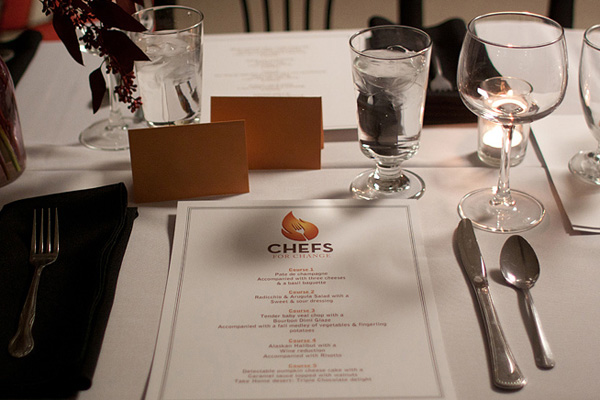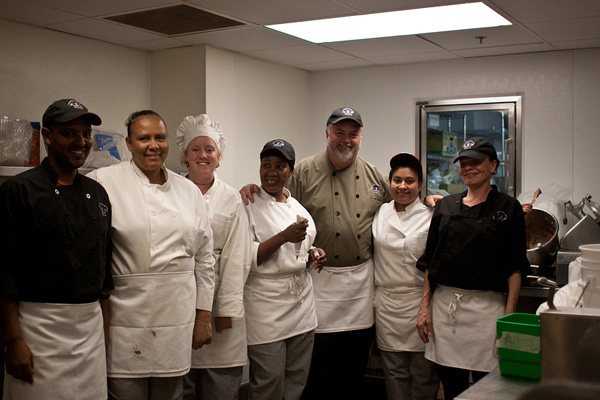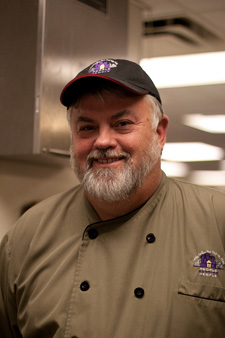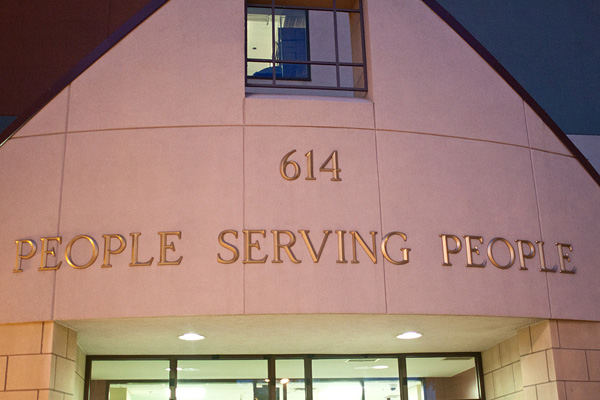
As Candice Austin talked about becoming a chef, her voice began to crack a little, her eyes welled with tears, and she had to take a deep breath. A glance at the table of diners sampling her multi-course meal revealed she wasn’t the only one getting choked up.
Austin (second from left, below) is part of the chef training program at People Serving People (PSP) and, at a recent Chefs for Change event, she spoke about the path that took her from prison to the shelter’s industrial kitchen.
“This program has humbled me, and motivated me,” she says. “The experience I’ve gotten in this kitchen is beyond words. In my life, I’ve been a ‘taker,’ but when I came here and saw people working so hard to give, it changed me.”
Hearing Austin speak so sincerely about how the culinary program transformed her life gave the dishes a little more depth and flavor. How can any chef compete with an entree fashioned from such deep gratitude?

The Chefs for Change series, which PSP calls “an elegant dinner party with a purpose,” doesn’t normally showcase the skills of these passionate trainees, which made the recent dinner unique. Past dinners (see our coverage of a previous event) have centered on a notable local chef, like Scott Pampuch representing Corner Table and The Barbary Fig’s Brahim Hadj-Moussa. Other participating restaurants have included The Oceanaire Seafood Room, Porter & Frye, and The Capital Grille.

Put on monthly for the past seven years, the events are held in the shelter’s brightly decorated, cozy dining area, which serves about 100 families per day. The residents stay at PSP to get their lives back on track, notes Development Coordinator Lauren Rimestad, and the place is packed with services like an on-site preschool, tutoring, after-school programs, employment counseling, and job training programs.
Although the dining room was quiet on the night of the recent dinner, Rimestad says that it’s usually a hive of activity, and that the dedication of the head chef, Mike Seiler (right), is one of the main draws. “We always joke about the ‘PSP 10,'” she says. “When you start working here, you can’t help but gain a little weight from all the amazing food.”
Seiler himself is an intense guy, the kind who looks at you like he’s just waiting for you to say some bullshit that he can shoot down. That ferocious concentration is perfect for students, because it weeds out the dedicated from the lazy fairly quickly. In talking about the successful, 13-week culinary training program, he sounds like part coach, part head cheerleader.
“Everyone is allowed one time for being late, and even then, it had better be a good excuse; don’t tell me your bus wasn’t on schedule,” he says. “I don’t want you here if you don’t make a commitment. I don’t have time for that.”
Then his tone softens as he watches some of his students scurrying to prepare the dinner. It’s pretty obvious that even though he’s more than capable of kicking someone out of the program (and has, on many occasions), he’ll reward hard work with an avuncular flair.
“I love food, and I really love watching people develop their own love for food and for service,” he says. “The dedication of many of these students can be inspiring. Some of them have never been successful doing anything, but they really put their heart into this, and by the end of it, they can make a meal for 300 people. Tell me that doesn’t make you feel like you accomplished something.”

Seiler landed at PSP about 25 years ago, after cooking at the St. Paul Athletic Club, and then running restaurants in Stillwater and Forest Lake. In 2003, PSP’s then-executive director told him that cooking for hundreds of residents wasn’t enough of a contribution, he recalls, laughing: “He gave me a challenge to come up with something more meaningful, and so I did.”
Since its inception, the program has graduated 154 people, with some going on to the banquet departments of hotels like the Hilton, and university dining kitchens. Seiler is ready to keep it going strong long into the future.
Although there’s been a parade of local celebrity chefs as part of the monthly dinners, the recent event showed that the real chefs for change are the students like Austin, whose names aren’t well known in culinary circles.
She ended her talk with a quick story about her first day at the program, in which she was asked to peel and cut two cases of squash. “I thought I was going to die,” she says, with an enormous smile. “But from that point on, I realized the value of hard work, and of using my hands, and I knew everything would be different.”


I am the proud wife of Head Chef and teacher Michael Seiler, the person who wrote this article has really nailed his personality.
I’ll never forget the night years ago, he came home and told me he was speaking in the morning before his very first graduating class of students. He wanted to get it just right, his speech, he wanted them to know how proud he was of them, but he did not want to get too emotional. The teaching program is a fantastic program with a most exceptional teacher.